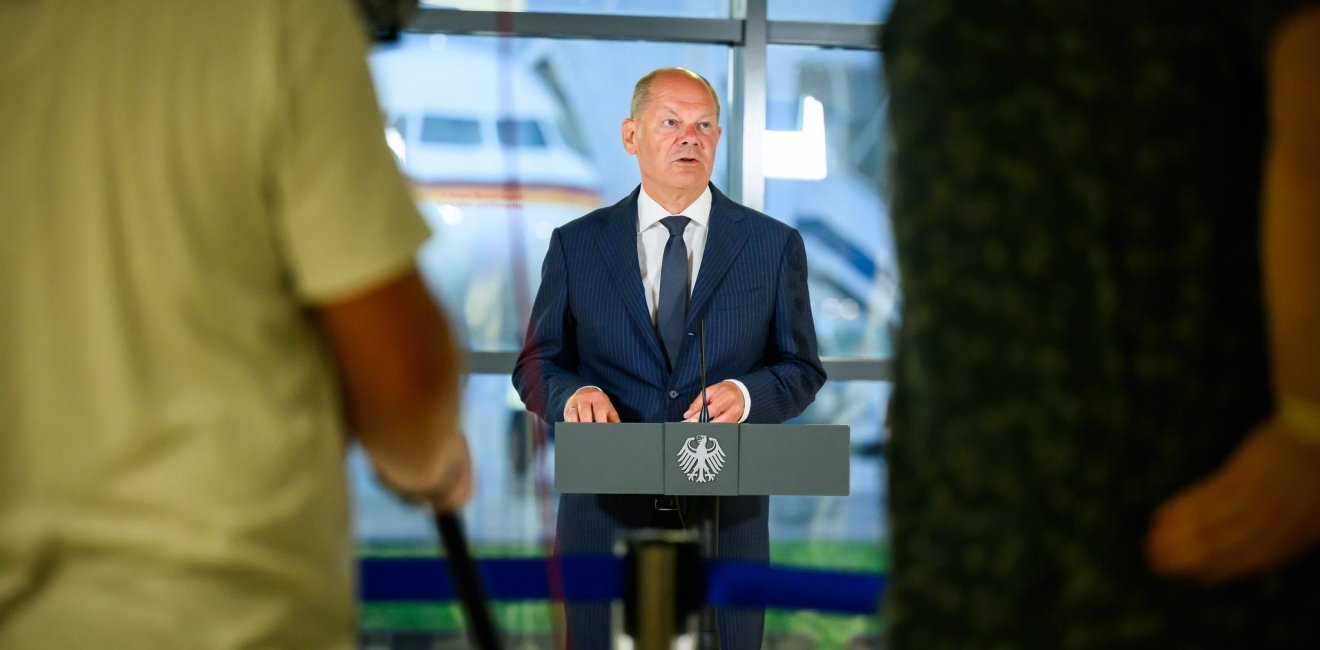The deal that freed 16 people from Russia on August 1 was the largest exchange of its kind since the Cold War. As President Biden greeted returning American citizens Evan Gershkovich, Paul Whelan, and Alsu Kurmasheva at Maryland’s Joint Base Andrews, the size of the swap was hard to fully appreciate. The actual exchange took place in Ankara and the parameters of the operation were closely held. Much of the US media focus has been on the Americans and Russians. But what made this deal remarkable was its breadth. This wasn’t just a US-Russian negotiation. The US needed Allies to pull it off. One ally was crucial: Germany.
Berlin has considerable experience with prisoner swaps. Throughout the Cold War, the picturesque Glienicke Bridge—spanning the Havel River border between West Berlin and East Germany—became a favored place to exchange captured Cold War operatives. History and film buffs still call it the “Bridge of Spies.”
But the August deal wasn’t a Cold War spy swap. These Western prisoners had been arrested and held specifically to give Putin leverage. Because Putin DID have his operatives in Western jails, and he wanted them back.
He was particularly interested in Vadim Krasikov, serving time in a German prison for a dramatic murder in Berlin. In August 2019, Krasikov cycled up to Georgian refugee and former Chechen separatist fighter Zelimkhan Khangoshvili, shooting him in broad daylight in a public park in the center of town. Krasikov succeeded in killing his target, but badly bungled his escape attempt. The crime made headlines across Germany, a contemporary coda to the Berlin’s Cold War reputation.
German officials initially held off on attributing the action directly to Russia (though it clearly fit a pattern, including the attempted assassination of Sergei Skripal in the UK the year before). But then, at his 2021 trial, German prosecutors openly linked Krasikov to Russia’s Federal Security Service and the judge later linked the killing directly to President Putin. Krasikov was sentenced to life in prison.
Releasing Krasnikov—the key to the August deal—would be a tough decision for Germany’s fractious coalition government and Chancellor Scholz. Today’s Germany is a careful advocate of rule of law, judicial procedure, and keeping politics out of the courtroom. No one would have put money on German agreement.
That’s why the exchange needed to be bigger than the US and Russia. Early discussions reportedly focused on adding Russian opposition activist Alexei Navalny to the group. Navalny’s courageous efforts to be a voice for a more democratic Russia had strong supporters in Germany; when he was poisoned in Russia in 2020, he was evacuated for treatment in a Berlin hospital. It undoubtedly saved his life. Only after his return to Russia in January 2021 was he arrested and imprisoned. Getting Navalny out of jail—and out of Russia—would be a move Germany could and would support.
Freeing Navalny was likely a step too far for Putin. Navalny, shunted out of sight to a prison camp in the Arctic Circle, died in early 2024. Putin decided to announce his death on the opening day of the February Munich Security Conference; it was a deliberate slap in the face of democratic leaders gathered there.
Navalny’s death could have scuttled the deal—but it didn’t. Germany still had something to gain. In the end, five of the prisoners swapped were Germans or German-Russian dual nationals. The exchange also included Russian activists opposed to Putin’s regime. Like Lilia Chanysheva, Ksenia Fadeyeva and Vadim Ostanin, who led regional offices for Aleksei Navalny. Or like Oleg Orlov, once a leader of Memorial, a Russian human rights organization founded in the 1980s. Orlov’s crime? Public opposition to the war in Ukraine.
Broadening the deal made Germany’s agreement possible. Meeting Putin’s demand for Krasikov wouldn’t just free US citizens—it would also free German citizens and Russian human rights defenders. It is worth remembering, too, that in Germany life sentences like Krasnikov’s are rarely truly life-long. There was still disagreement within the coalition government about the release; the decision has since also been criticized by some opposition conservatives as setting a dangerous precedent.
In the end, the decision turned on the strength of US-German relations. Asked whether the deal would have been possible without agreement from Chancellor Scholz, the President was clear: no. “Other leaders trust you, you trust them, you get things done.” Chancellor Scholz is famously reserved and often hard to read—a pragmatic idealist. But he has developed a strong personal rapport with President Biden, whose commitment to rebuilding America’s alliances was a core administration value. That rapport made it possible for Scholz to block Nordstream 2 before Russia’s invasion of Ukraine. It also (eventually) led to a deal facilitating the delivery of German Leopard tanks to Ukraine.
President Biden welcomed the three Americans released by Russia on the tarmac at Andrews after an emotional announcement at the White House. His public gratitude to Chancellor Scholz was echoed by National Security Advisor Jake Sullivan. And when a reporter asked what Chancellor Scholz had asked for in exchange for their cooperation, President Biden’s answer was “nothing.” Partnership was enough.
Chancellor Scholz welcomed the 13 other detainees on the tarmac in Cologne, Germany. His comments—understated and direct—put freedom first. Noting that the decision to release convicted murderer Krasnikov wasn’t easy, he stressed he had weighed it against the liberty of those unjustly imprisoned in Russia. “That is why we have an obligation to German nationals as well as solidarity with the United States.”
In the end, it was this trifecta of interlinked interests—commitment to freedom, obligations to German nationals, and partnership with the US—that mattered.
Author


Global Europe Program
The Global Europe Program is focused on Europe’s capabilities, and how it engages on critical global issues. We investigate European approaches to critical global issues. We examine Europe’s relations with Russia and Eurasia, China and the Indo-Pacific, the Middle East and Africa. Our initiatives include “Ukraine in Europe”—an examination of what it will take to make Ukraine’s European future a reality. But we also examine the role of NATO, the European Union and the OSCE, Europe’s energy security, transatlantic trade disputes, and challenges to democracy. The Global Europe Program’s staff, scholars-in-residence, and Global Fellows participate in seminars, policy study groups, and international conferences to provide analytical recommendations to policy makers and the media. Read more

Explore More
Browse Insights & Analysis
The OSCE is a Good Value for America



